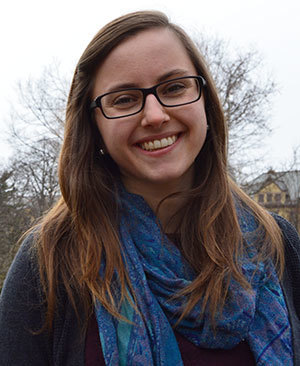 Melanie Wallskog
Melanie Wallskog
Notre Dame economics major Melanie Wallskog walked into her professor’s office hours with a question. She walked out with a job.
That simple act of reaching out to a professor led to research opportunities in Nicaragua, Ireland, and Chicago. The senior from Bloomington, Indiana, has now co-authored a paper with two of her professors and is working on her senior thesis.
In the fall of her sophomore year, Wallskog went to see Assistant Professor Wyatt Brooks, who was teaching her Principles of Macroeconomics course. That initial visit led to a job offer—working alongside Brooks and Assistant Professor Kevin Donovan on a development economics project in Nicaragua.
The two professors were researching the effectiveness of a nonprofit organization that builds footbridges in rural areas of the country, where residents are often cut off from the outside world due to heavy rains. Their project evaluated the impact such bridges have on food security, school attendance, and access to health care.
Wallskog, who also is completing a supplementary major in applied mathematics and computational statistics, developed the survey instrument for the project and traveled to Nicaragua the following summer to provide support and supervision.
“Going from the classroom—where I had only studied very simple theoretical models—to working on an active research project and actually going into the field gave me a much more comprehensive view of what economists actually do,” she said. “It drove me to be very excited about the power of economic research.”
The opportunity was the first of many for her in the field of economics research—an area she was originally drawn to because it allows her to use math skills to help others.
In spring 2014, Wallskog landed a position as a research assistant at the Wilson Sheehan Lab for Economic Opportunities (LEO), a research center that aims to identify innovative, effective, and scalable anti-poverty programs through impact evaluations.
Wallskog has spent the last year and a half helping to evaluate a homelessness prevention call center in Chicago that’s operated by Catholic Charities, a key partner in many LEO projects.
Through a quasi-experimental analysis, the team is looking at situations where people from similar backgrounds call to request emergency financial assistance—typically less than $1,000 to pay rent, security deposits, or utility bills.
Because the amount of funding for these requests is precarious and varies from day to day, some eligible callers will receive funds while other requests will not be honored because money has run out.
By comparing the outcomes of those who receive funds and those who do not, the team can ascertain the effectiveness of the program.
So far, Wallskog said, the results are encouraging—with just a little bit of financial assistance to help with a key bill or expense, individuals and families are able to stay in their homes.
“We’re seeing really positive results for homeless shelter admittance; it’s actually pretty remarkable,” she said. “There’s a 60 to 70 percent reduction in the likelihood of entering a homeless shelter within a few months if someone is given this little bit of money.”
Now set to graduate in 2016, Wallskog has written a paper on these results with LEO co-founders James Sullivan, the Rev. Thomas J. McDonagh, C.S.C., Associate Professor of Economics, and Bill Evans, the Keough-Hesburgh Professor of Economics and chair of the department. The paper is expected to be submitted for review in early 2016.
Wallskog’s research experiences don’t stop there. A member of the Glynn Family Honors Program, she plans to complete a senior thesis as well as an additional project this year, with support from her thesis adviser, Steven Lugauer, an assistant professor of economics.
In her thesis, Wallskog examines the relationship between demographics and savings in Ireland. To investigate how the country’s aging population has led to a decreased savings rate, she is applying a model Lugauer used in a project with Alfred C. DeCrane Jr. Professor of International Economics Nelson Mark and alumnus Chadwick Curtis to explore similar issues in China.
She conducted her research during her junior year, while studying abroad at Trinity College Dublin.
Her second project, also with Lugauer, focuses on how people make the decision of whether to go to school or into the workforce, and how that changed during and following the late-2000s economic recession, when young workers experienced much more labor volatility than older workers.
It’s an issue she and her peers can certainly relate to.
“From a current student perspective, it’s very relevant to study why people my age experience significant levels of labor volatility,” she said.
As for her own future plans, Wallskog intends to enroll in a Ph.D. program in macroeconomics or development economics.
“I would definitely never have thought to pursue a Ph.D. if I was not doing research,” she said. “My experiences taught me that I could love a life of research. I’m extremely thankful for the research opportunities Notre Dame has granted me. Economics is a fantastic home for students who want to engage with professors and research outside the classroom.”


